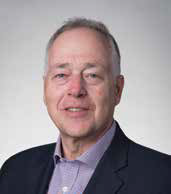

Wolf Frenkel
GENERAL COUNSEL
BearingPoint
Geneva, Switzerland
To see what other CLOs are talking about, please visit www.acc.com/clo.
Most lawyers regard the general counsel role as the pinnacle of an in-house career. The path to GC varies by individual and company, of course. For Wolf Frenkel, the general counsel of professional and technology management at consulting firm BearingPoint, headquartered in Amsterdam, the journey to the top of the in-house profession hasn’t been a straight climb up the rungs of a professional ladder. His journey was influenced by uncertainty, love of the unknown, flexibility, and luck. Over his 25-year in-house career, he has learned the difference between legal and business advice, the best way to organize a legal department, and the challenges facing in-house today. The growing issues confronting a GC span the gamut, from the speed of regulatory forces to the latest legal operations tools, and the frailty of the human condition.
Frenkel joined BearingPoint in 2010, shortly after the US head office of the company declared bankruptcy. After 16 years as an inhouse counsel, mostly at Sun Microsystems, Frenkel saw BearingPoint not only as an opportunity to reach the GC mantle, but also a chance to structure a legal department in the most efficient way possible. After BearingPoint Inc. filed for Chapter 11, its European partners did a management buy-out to acquire the bulk of the assets, primarily in Europe. The leadership was looking for the its first general counsel. Frenkel took the job — and confirmed that landing at the top of the in-house profession is a lot of work.
BearingPoint’s lawyers are spread across Europe, supporting five different business regions. Each region manages its own profit-and-loss statements, cost centers, and infrastructure. BearingPoint advises companies in four main industries: consumer goods such ]as media and entertainment and communications; industrial production such as automotive and life sciences; financial organizations such as banking and capital markets; and public services such as postal, defense, and government organizations. The legal department’s 20+ lawyers and paralegals mirror the management team in that they have a more holistic view of the company and its operations. However, lawyers in each country are primarily focused on that nation’s business and its adherent issues, although increasingly, many international clients require closely coordinated cross-border engagements. The lawyers typically only turn to Frenkel on escalation issues involving substantive risk assessment red flags and potential disputes that may threaten litigation. Frenkel notes that BearingPoint has very little litigation because the company is ultimately in the service industry and litigating with customers is bad for business.
Because of the distances among BearingPoint’s dozens of offices across Europe, from Romania to the United Kingdom, Frenkel relies on a mix of technology and old-fashioned “one-to-one” communication to instill and maintain a virtual management structure. The legal department only meets as a group a few times a year. During the year, lawyers will rotate among different cities in Europe. Frenkel likens it to a traveling band where almost everyone can play one another’s instrument, although some are stronger than others. In essence, the legal team operates as a hub — work is centrally dispatched via administrative support. For the customer-facing work, lawyers are directly solicited via the firm’s CRM system — the result of a finely-honed implementation of SharePoint. However, Frenkel laments the fact that keeping pace with the evolution of technology, and an increasing workload, still leaves much to be desired. He is still looking for the silver bullet of matter management.
As BearingPoint is, at heart, a company that offers advice, Frenkel is especially aware of encroaching regulations. He marvels at the speed of implementation of the EU General Data Protection Regulation, and Article 13, the new European regulation that holds tech companies responsible for material posted without a copyright license. Other challenges include the “human condition,” a euphuism for executives who are caught in the #MeToo movement or environmental issues, bribery, and corruption. As BearingPoint is expanding its reach in many of the emerging markets, more resources and education are being deployed to counter the risks that promise the rewards. Brexit, which Frenkel calls “the mother of change management,” will undoubtably create new business for his firm, because nearly every company will have to reorient their approach to doing business in the United Kingdom, regardless of the political outcome. But even when some developments create business opportunities, there are a lot of unknowns, which create mountains of risk. “In all of these areas, you have changes that are coming faster than what the law schools or technology can keep up with,” Frenkel says.
Playing catchup with regulatory frameworks was particularly challenging when he wore both the compliance and GC hats. This dual function was necessary when the company was emerging from its management buy-out. Gradually, Frenkel realized a “critical mass of inevitable conflict” arose when he was asked to support a strategic initiative in a new market while also maintaining compliance in an uncertain region. As BearingPoint expanded into Asia, South America, and Africa, he knew the compliance and legal roles needed to be separated, and the company hired a full-time compliance officer. He suggests: “I would counsel anybody who’s doing both roles to challenge themselves often: Are they truly comfortable managing both sides of an issue?”
Frenkel’s next goal is to properly implement a legal operations function at BearingPoint. In previous positions, he has seen how powerful technology has evolved and knows it could make his team more productive. Plus, as a technology and advisory company, he sometimes feels like “a child of a shoemaker who doesn’t own any shoes.” The ability to marry technology and personnel will be the final piece in the creation of his legal department. It’s an opportunity that has been a lifetime in the making.
An uncertain law student finds his calling
“It seems funny, but I never wanted to be a lawyer,” Frenkel says, remembering how he settled on law school in 1980 during an economic recession, after ruling out medical and business school because they seemed more difficult. He went to law school without any grand expectations. And then he absolutely loved it. Looking back, he says he wouldn’t change a thing. “I was just very lucky that something pushed me to do it. It has changed my entire professional life.” Frenkel chuckles when he remembers the time one of his high school teachers told him he should go to law school, only to bump into that very same teacher years later, many years his senior, but then junior to him as a lawyer.
Upon graduating from McGill University, Frenkel remained in Montreal, where he worked in private practice for 10 years. For him, working in a law firm was a critical first step in his development as a lawyer. There’s a deep discipline around the meaning of the law in law firms, he explains, that is different from working in-house, where the goal is to be a “legal” problem solver.
Frenkel enjoyed law firm life. He counseled technology businesses and manufacturing companies on joint ventures, M&A, and licensing agreements. At that point he thought the top of the legal profession was becoming a partner at a top-tier firm. He was on that path until another one of life’s passions changed his trajectory: love of the unknown.
At the behest and prodding of a very close friend preparing to write the California bar, Frenkel succumbed to the lure and challenge, and within one year of passing the state bar, he moved to San Francisco to try his luck in the Golden State. However, Frenkel quickly realized that his Canadian legal credentials were not opening doors for him in the big city, or even Silicon Valley for that matter. He made another fateful decision and decided to move in-house.
The in-house practice, from California to France
The journey to becoming a European general counsel started in Santa Clara, California, in Frenkel’s case. His background in technology law got him a job with the PMI Group, Inc., a subsidiary of Allstate Insurance, where he was responsible for the management of licensing proprietary software, as well as general business and legal advice. He reflects: “I haven’t given a truly ‘legal’ opinion in probably close to 20 years.” Frenkel says he gives advice and recommends courses of action, and that’s an important distinction for him.
His longest employment before assuming his current position at BearingPoint was with Sun Microsystems, an American technology company that created the Java programming language, among other developments in enterprise computing. At Sun, Frenkel says he truly learned what it is to be an in-house counsel. Sun was expanding globally, and they tapped him to join the European legal team. Now his foreign credentials worked in his favor: the California company wanted someone who knew its business well to lead its operations on the continent. His North American roots gave him the opportunity to serve as an assimilator, translator, and diplomat among lawyers who hailed from all over Europe. “Being in Europe, you deal with many cultures, many languages, and a lot of history. There is a lot of deep traditions in Europe that provide subtle context if you’re intent on speaking your mind,” Frenkel says. Sometimes he had to serve as a referee among various nationalities to keep the peace.
Thanks to his Montreal upbringing, he was fluent in both French and English. Although his colleagues could often speak four or five languages, Frenkel could translate their concerns into another “language:” the business objectives emanating from California. This skill is what made him an asset in Europe. During escalation disputes, he could act as a go-between leadership in the US and European colleagues. Coming from California provided more clarity into what the company was trying to do in Europe, and his ties to the California leadership advanced his career faster than if he had joined the company from Europe.
He continued to rise through the ranks until Oracle purchased Sun in 2010. When it became clear that he wouldn’t obtain that pinnacle of the in-house profession — the GC role — he took another chance by moving to BearingPoint. “Not only was this a really great opportunity to get the mantle of general counsel, but it was also a chance to form a law department according to my view of what makes a really good legal team,” Frenkel recalls. If everyone is destined to rise to their level of competence, Frenkel felt he was not quite there, but willing to chance it.



